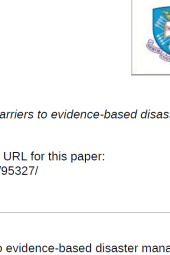Barriers to Evidence-Based Disaster Management in Nepal: A Qualitative Study
Summary
This report is a sum of case studies conducted with the objective of exploring the barriers to evidence-based disaster management encountered in Nepal. This study explores barriers to evidence-based disaster management in Nepal, recognizing the increased frequency of disasters globally despite international efforts. The aftermath of disasters disproportionately affects poorer nations, hindering their development. Effective disaster management, including risk reduction and emergency responses, is crucial for minimizing adverse consequences. The key to this is implementing evidence-based practices in disaster management, aligning with the gold standard doctrine of evidence-based medicine.
However, the implementation of evidence-based practices in disaster management, especially in low- and middle-income countries like Nepal, faces challenges due to a lack of an evidence base. The study aims to identify barriers to evidence-based disaster management in a LMIC setting, drawing on Nepal as a case study. It acknowledges uncertainties about achieving evidence-based practice and recognizes that determinants and barriers identified in high-income countries may differ in developing nations. The study seeks to uncover specific challenges in Nepal to inform strategies for improving evidence-based disaster management in LMIC settings.
Categories:
Article
Publisher:
White Rose Research Online
Published Year:
2016
